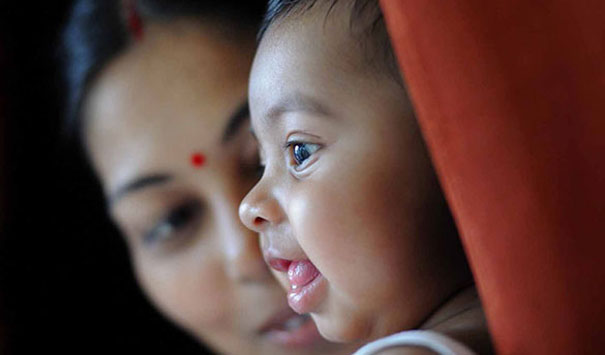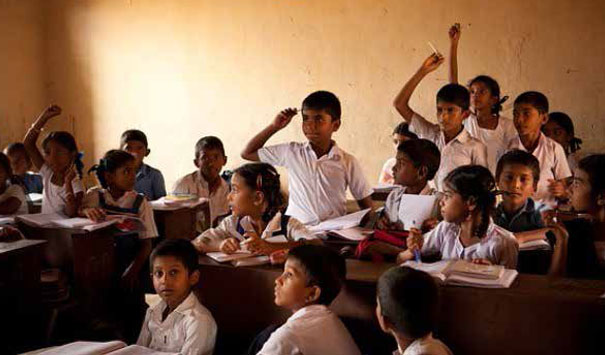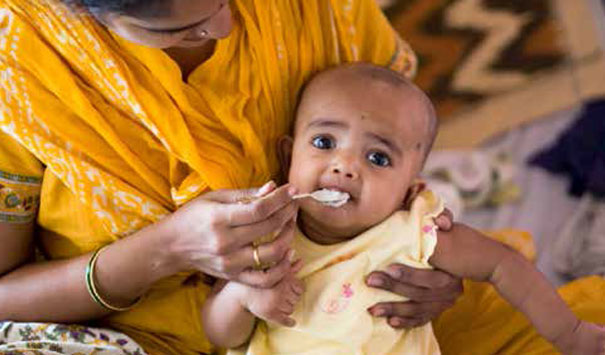Globally, the AKDN’s early childhood development initiatives provide 750’000 children aged pre-natal-8 with flexible and contextually relevant quality early learning opportunities at a cost that is affordable for government, families and communities.
The Aga Khan Foundation’s ECD programmes give special attention to protection and safety, good health and nutrition, affectionate and responsive interaction and communication, play, and stimulating environments which enable young children to learn better at home and in formal care. For 40 years, the Foundation has given attention to the multiplicity of factors which ensure the quality of life for children by working at multiple levels (community through to policy) and with a range of partners (AKDN, local and national governments, civil society, private sector, academic institutions, and parents and communities).
The Nizamuddin Urban Renewal Initiative has coupled conservation with socio-economic initiatives aimed at improving the quality of life for Nizamuddin Basti’s residents through simultaneous action towards providing education, health, sanitation, vocational training facilities. Furthermore, upgrading available public infrastructure, landscaping open parks, major street improvement, housing improvement, building community toilets coupled with heritage and environmental awareness programmes further help meeting project objectives and UN Sustainable Development Goals. The early childhood care and development programme aims to address the educational and development needs of children under 6 years. Children enrolled in the aanganwadis, children in the Nursery section of the SDMC school and the children in the demonstration centre are part of the programme. In addition, children benefit indirectly from the parenting programmes organised for their caregivers. The project has worked towards improving the infrastructure of aanganwadis wherever possible, prepared a pre primary curriculum which includes an activity bank, trained the government aanganwadi workers and helpers on using the curriculum and increased engagement between the aanganwadi and community and has initiated a community based monitoring system.
Nizamuddin Basti has seven government aanganwadis run
by the Department of Women and Child Development,
Government of Delhi. These are part of the Government of
India’s Integrated Child Development Scheme. In addition,
there is the Nursery section of the SDMC School. In 2007,
when the project began, there was low awareness about the
aanganwadis and very low enrolment.
This component began in 2010, almost two and half years
after the main project began as working with the
aanganwadis needed a separate MoU with the Department of Women and Child Development. On signing the MoU, we
conducted a baseline study that identified three major areas
that needed intervention – these were preschool education,
malnourishment and early stimulation of infants
The study found that the school readiness of the few
children in the aanganwadi centres was poor owing to the
fact that pre school education was almost absent in the
centres; almost 50% of the children showed stunting largely
due to malnourishment and the parenting practices did not
lead to development..
Our project interventions in early childhood care and development focus on ensuring that every child in our project area gets a good start in life with a special focus on health and education through empowering and informing the community to take decisions that benefit the wellbeing of their children and simultaneously strengthening the government systems.
To achieve these objectives, the project engages in the following
The project works towards strengthening the government aanganwadis through improved infrastructure wherever possible, improving the pre-school education offered to children enrolled in the aanganwadis, regular growth monitoring and immunisation of the children (through the community health programme ). Efforts are ongoing to get the aanganwadis to perform all the functions that they are mandated to under the Integrated Child Development Scheme.
Raising awareness has evolved over a period of time in the project. It began with extensive awareness activities that included street plays and performances to using annual basti level events like the apni basti mela. Working with the community is now more intensive and is through meetings with mothers, the parenting programme or the community based monitoring.
From a situation where there was very low awareness about the existence of aanganwadi centres to a situation where community members monitor their status and functioning through a group called the Aanganwadi Nigrani and Sahayata Samooh (ANSS). This group visits all the seven aanganwadis regularly on a weekly basis and then compile the report on a monthly basis to share with the Department of Women and Child Development
The ECCD component has elements of improving the physical conditions of aanganwadis wherever feasible as well strengthening the functioning and community processes. The multidisciplinary team comes together to ensure that all these functions are met as is seen in the revamped aanganwadis and the new curriculum.
We work in the three major areas identified in the baseline study i.e. addressing malnourishment, improving school readiness of children and early stimulation of infants. All these programmes are targeted at all children under 6 years, some of whom are enrolled in the aanganwadis.

The ECCD initiatives aim to facilitate holistic development of children and their transition to school and reaches out to at least 80 percent of the children in the Hazrat Nizamuddin Basti. With regular monitoring, awareness and care it is hoped that child’s development is not compromised. In 2008, there was very low awareness about the aanganwadis. The situation has improved considerably, now 88 % women are not only aware about the aanganwadi but also the programmes available in it. 66 % of the children between the ages of 3 to 5 years are enrolled in pre primary schools, either government or private compared to 62 % in 2008. The community is noticing the impact of the programmes and have reported that their 3 year olds ask them to wash hands before meals.

Improving preschool education and pre primary education in the government aanganwadis to improve school readiness of children. Continued support was given to the aanganwadi centres by the community teachers in the year 2013; seven community teachers were placed in different aanganwadi centres. The classes were held daily to provide the continuity to children to arrive at better learning outcomes for children. The attendance of children to the centre has improved significantly though extreme weather and Ramzaan still cause a sharp dip in the attendance. The curriculum was developed in 2012, taking into account the local context. In 2013, this curriculum was field tested through a process of workshops, development of implementation plans, classroom observations and teacher interactions. In addition, capacity building of the teachers continues.

Malnutrition remains a serious concern in Nizamuddin and much effort has been made to improve understanding on nutrition within the community. Three major components towards addressing malnourishment are thus being undertaken– monitoring the growth of all children below 6 years of age in the Basti, addressing children who are severely malnourished through direct intervention and making low cost nutritious snacks available in the Basti. Initiated in late 2012, the Zaika E Nizamuddin women’s group was initiated as a response to address malnourishment of young children in Hazrat Nizamuddin Basti. The group has since then been very active, and received a grant from the Australian High Commission in 2015. In 2016-17, the group is poised to become an independent group.
A People-Public Partnership with the Department of Women and Child Development